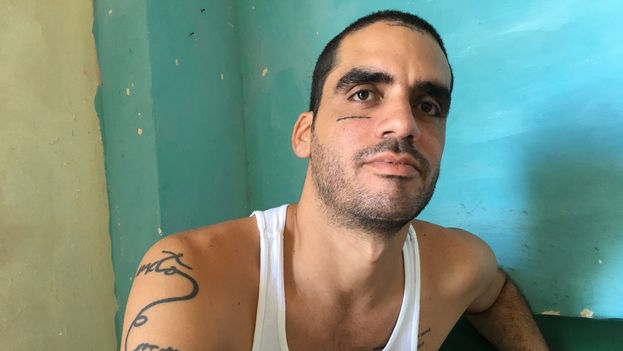
![]() 14ymedio, Mario Penton, Miami, 15 May 2017 — The artist Danilo Maldonado, known as ‘El Sexto’ (The Sixth), announced his desire to reside in the United States, although he will remain attentive to what happens in Cuba to be able to denounce the arbitrary detentions.
14ymedio, Mario Penton, Miami, 15 May 2017 — The artist Danilo Maldonado, known as ‘El Sexto’ (The Sixth), announced his desire to reside in the United States, although he will remain attentive to what happens in Cuba to be able to denounce the arbitrary detentions.
Maldonado, whose girlfriend, Alexandra Martinez, is a US citizen, declined to respond to a request from 14ymedio to confirm his decision to remain in the United States. For her part, Martinez said that the artist was not going to give statements on the matter.
El Sexto recently concluded the exhibition Angels and Demons in San Francisco, where he staged a three-day performance in which he was enclosed in a replica of the punishment cell in Havana’s Combinado del Este prison where he was held.
The artist has been arrested three times for political reasons.
In 2014 he tried to stage a performance titled “Animal Farm,” in which he intended to release two pigs with the names Fidel and Raul painted on their sides. Although he never managed to stage the performance, it cost him 10 months in Valle Grande prison, on the outskirts of Havana.
The artist has been arrested three times for political reasons
In the dark hours of the morning after the announcement of the death of Fidel Castro, Danilo wrote “He left” on one of the walls of the Habana Libre Hotel, which cost him another 55 days in prison.
“This can not be a one-day protest, right now this is happening in many countries, even our neighbors, and we have to report it,” Maldonado told EFE in reference to repressive actions against dissidents and human rights activists.
During the 36 hours of the performance in San Francisco, titled Amnesty, El Sexto remained without food in solidarity with the Cuban political prisoners Eduardo Cardet and Julio Ferrer, among others. The artist also dedicated his hunger strike to Leopoldo López and the other Venezuelan political prisoners.
Maldonado took the pseudonym El Sexto (The Sixth), with which he signed his graffiti on the streets of Havana, as an ironic response to the Cuban government’s campaign for the return of the so-called “Cuban Five,” five spies who were then in prison in the United States.
In 2015, Danilo Maldonado, 34, received the Vaclav Havel Prize for Creative Dissent, awarded to activists “who engage in creative dissent, exhibiting courage and creativity to challenge injustice and live in truth.”
